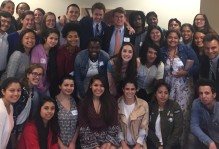Day 5 of 10: A New Pledge of Quality
January 7, 2015
The site visit of today was Langley High School. If you’re unfamiliar with the DMV area, like myself, Langley is one of the more well-off schools. For example, 97% of the students go on to attend college. The school was gracious enough and capable to spare six administrators for our Q&A session. Empathy and exposure lead the conversation with the argument that these characteristics should extend to both teachers and students cycling among the officials. To quote, “It’s hard to put yourself in someone else’s shoes if your environment doesn’t expose you to different situations.” Nationally, the topic of white privilege and racial disparity has reared its ugly head into everyday conversation, but particularly in the field of education. A few minutes into this heated subject, the PA system came on and this peppy voice encouraged us all to please stand for the pledge of allegiance. I’m pretty sure it had been a while since any of us said the pledge as many of the faces around me were filled with sleepiness and uncertainty. As we mumbled the last “one nation under God” I was amused at how long ago high school seemed. To give you some background, the Urban Education class is a healthy mixture of all the grades with juniors making up the majority.
There’s a unique simplicity to high school in its way of unraveling the threads of unnecessary complications we weave throughout our lifetimes; things that seemed so important are long forgotten post-graduation. Oftentimes adults will describe their workplace as “just like high school”, political scientists will mention a global playground, and even young adults will say the “real world” parallels this institution. Although it’s easy to view education reform through the lenses of race and poverty, real change manifests from a variety of external factors beyond those parameters.
At Langley High, the administration boasted about how many of their students went on to college but the question we tossed around in discussions was, Why does college define success? One of the representatives from the Literacy Lab raised a valid point of an educational quality deficit in this country by proposing that, if all variables were fixed, a high school education would mean something. The reality is schools are turned into “testing factories” obsessed with high scores and data statistics rather than producing students who can critically evaluate information and build a personal philosophy grounded in facts/experiences. A Langley teacher stated she doesn’t give her students busy work due to her personal philosophy that teachers should be able to defend why they give work and do the things they do. In that same light, teaching flows beyond curriculum into real life where teachers and policymakers have to consider the effects their actions will have on students.
Langley concluded that open discussion and communication could solve a lot of the disconnect problems between grounds-level educators and top officials. Combining Michelle Rhee and Diane Ravitch’s principles on education reform, I slowly identified key features that would resound in opinions throughout the week.
- The teaching profession needs to be respected. Teachers across America are demoralized. Reformation needs to include a career ladder & standards of quality for the educators and encourage empathy from the general public.
- America needs to regain its competitive spirit. Rather than dumbing down standards of learning, meet the students at their level and together raise them up to excellence.
- Education is about producing quality citizens and is not to be influenced by partisan interests.
- “A free society fosters creativity and risk-taking. Private for achievers and public for others is the re-segregation of public schools. Kids have to have a reason to want to go to school.”
Sitting in the Langley art class admiring the incredible talents of such young individuals, I realized the national discussion on education often neglects to include the value of arts. In an academically competitive environment, like William & Mary, classes like art or acting can be the respite students need to keep from reaching their boiling point. Schools hide suicide statistics, but that’s a bleak reality of society. Just as teachers burn out so can students. In a society where we condition students to believe that college equals success, what happens to those students who 1) struggle in academics, 2) have no desire to pursue higher education, and 3) are pressured into this internal conflict? What message are we sending students? For which does the republic stand? What does “liberty and justice for all” entail in education?
~ Lynelle Haugabrook



No comments.
Comments are currently closed. Comments are closed on all posts older than one year, and for those in our archive.